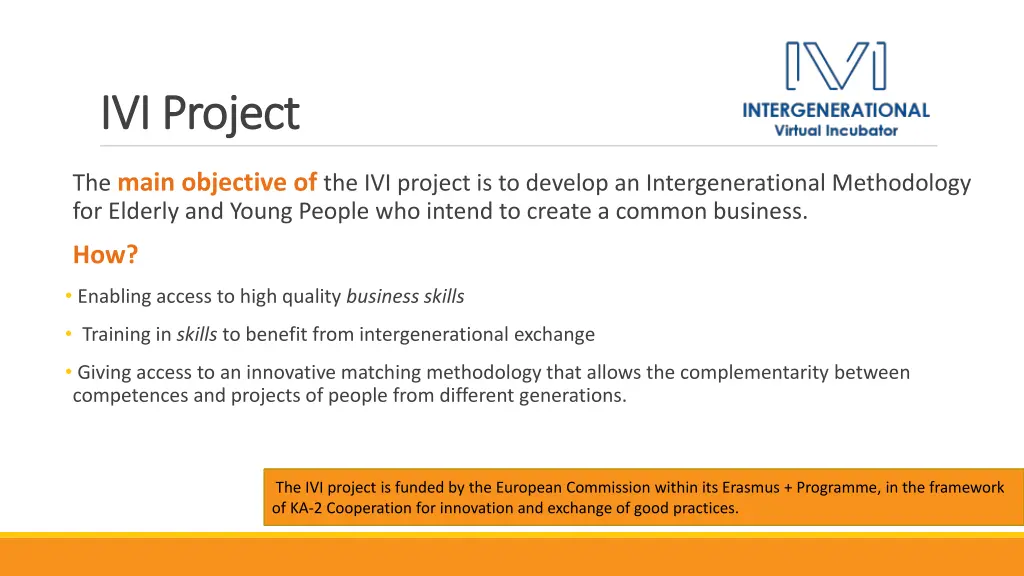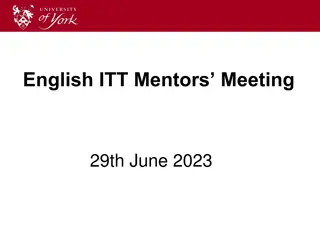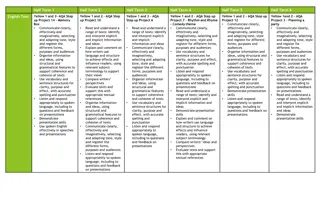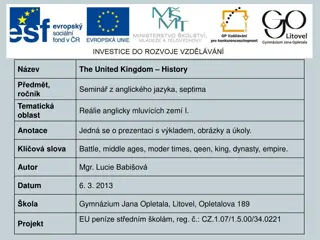
Intergenerational Entrepreneurship Methodology
The IVI project aims to develop an Intergenerational Methodology for Elderly and Young People to collaborate on creating common businesses. Through high-quality business skills training and innovative matching methods, the project seeks to foster intergenerational exchange and address challenges like an aging population in Europe. It aims to stimulate synergies between universities and NGOs to promote social innovation and enhance entrepreneurial skills across generations.
Download Presentation

Please find below an Image/Link to download the presentation.
The content on the website is provided AS IS for your information and personal use only. It may not be sold, licensed, or shared on other websites without obtaining consent from the author. If you encounter any issues during the download, it is possible that the publisher has removed the file from their server.
You are allowed to download the files provided on this website for personal or commercial use, subject to the condition that they are used lawfully. All files are the property of their respective owners.
The content on the website is provided AS IS for your information and personal use only. It may not be sold, licensed, or shared on other websites without obtaining consent from the author.
E N D
Presentation Transcript
IVI Project IVI Project The main objective of the IVI project is to develop an Intergenerational Methodology for Elderly and Young People who intend to create a common business. How? Enabling access to high quality business skills Training in skills to benefit from intergenerational exchange Giving access to an innovative matching methodology that allows the complementarity between competences and projects of people from different generations. The IVI project is funded by the European Commission within its Erasmus + Programme, in the framework of KA-2 Cooperation for innovation and exchange of good practices.
IVI Consortium IVI Consortium
Challenges Challenges Challenge 1: Addressing the challenge of an ageing population in Europe by enabling older people to remain socially and economically active in society through entrepreneurship. Challenge 2: To allow young people to believe in their ideas and to provide them with tools that allow innovative ideas to emerge. Challenge 3: To elaborate a guide for NGO professionals working with older people and/or young people on entrepreneurship.
Specific objectives Specific objectives To contribute to the development of the entrepreneurial phenomenon in Europe. To foster a new type of intergenerational relationship between young people and older adults in the field of entrepreneurship. To design, test and validate a methodology that facilitates intergenerational entrepreneurship between youth and adults. Stimulate synergies between universities and NGOs to contribute to the development of this social innovation in terms of intergenerational co-creation of enterprises. To provide guidance and tools to raise awareness of the added value of intergenerational collaboration as a means of social cohesion and knowledge transfer between generations.
Advantages Advantages This social innovation would allow: Fostering a new type of relationship between Youth and Seniors in terms of entrepreneurship and knowledge. Generate added value to entrepreneurship initiatives. To develop the digital skills of apprentices and thus increase their competitiveness in the market. Encourage the social and economic inclusion of older people and young people who may be discriminated against in the labour market because of their age or experience. Bridging the generation gap and addressing social isolation and intolerance.
RESEARCH ON INTERGENERATIONAL RESEARCH ON INTERGENERATIONAL ENTREPRENEURSHIP ENTREPRENEURSHIP
Target Target To identify the differences and complementarities of senior and young entrepreneurs in order to address viable intergenerational entrepreneurial projects that sustainable development, with special emphasis on the motivational and blocking factors that affect the phenomenon. promote social cohesion and
Methodology Methodology A mixed method approach to data analysis was used, combining quantitative and qualitative techniques. 1 2 A qualitative methodology (focus groups) was developed with the intention of deepening the perspectives of senior and young entrepreneurs on their needs and capabilities. A quantitative approach was applied to identify significant correlations between different factors (push and block factors) for entrepreneurship and entrepreneur profile. Topics for discussion Personal situation Questionnaire Professional Network Univariate analysis Perception of the intergenerational aspect of a society Perception of complementarities between seniors and juniors Perception of the role of each group in managing a common project. Hard and soft skills typical of each population. Multivariate analysis Perceived specific needs identified in terms of skills for each group
Results Results From the information obtained, seniors and juniors considered seven factors as the main concerns of intergenerational entrepreneurial teams: Connections and networks Financial aspects and financing Creation of ideas Support Passion Skills Trust
Motivations Motivations Common There may be other reasons why they became interested in entrepreneurship. They had an interesting business idea. To have the dream of starting a project. They have friends, spouses or partners who have already managed businesses. They want to make more money. More relevant for older people School, family and the media have awakened their interest in entrepreneurship. They became interested in entrepreneurship through friends. More relevant to young people They have a wider network than young people and stress the importance of social and professional contacts. They find it interesting to start a business. Family and cultural values motivate them to start a business. They are more willing to offer support with their expertise, time and financial resources. Families, partners or friends would provide advice, social or professional contacts, financial support and help with everyday problems. The absence of these values does not affect your decision to start a business. They perceive intergenerational entrepreneurship as a positive top-down approach. Important factors for entrepreneurship: passion, ideas, skills, social and professional contacts, support, funding and the trust of others. Some of his parents have run companies in the past. They have a broader know-how than young people. They know how to use and take advantage of social networks. They have existing and well-proven hard skills. Family, partners or friends motivate them. Young people have more technical knowledge and bring dynamism to a project. Older people allow themselves more time to succeed and are generally better at anticipating difficulties. They have some relatives who have already managed businesses.
Blocking factors Blocking factors Common They have no funding for their projects. More relevant for older people Problems in starting a business due to age. More relevant to young people Starting a business is complicated. Because of their age, they would have problems obtaining the necessary funding. Their financial situation or that of their families or partners. They have deficiencies such as lack of social and professional contacts, support, skills, confidence in others, passion or ideas. They lack the skills and knowledge that young people may have. Young people may be wary of older people, fearing that they may adopt parental attitudes. They will need more training in ICT and digital media, according to the project, as well as training in emotional management to work with young people. Possible age-related problems: discrimination, lack of certain skills, little support from others. They lack experience. They need to develop their emotional management and listening skills.
Conclusions There are significant differences in the factors that push or block the entrepreneurial decision between older and younger people. These differences can be interpreted as complementarities. Both profiles have highly proven complementarities that generate social value by working together in intergenerational teams, eliminating some of the vulnerabilities that these groups may encounter in society. Therefore, several areas need to be improved in order for the cooperation to work well. The main concerns of intergenerational teams identified in our research can be a good starting point for those working with entrepreneurial population and those with entrepreneurial intentions, to identify profile characteristics, motivations and needs, to promote the creation of intergenerational projects.






















